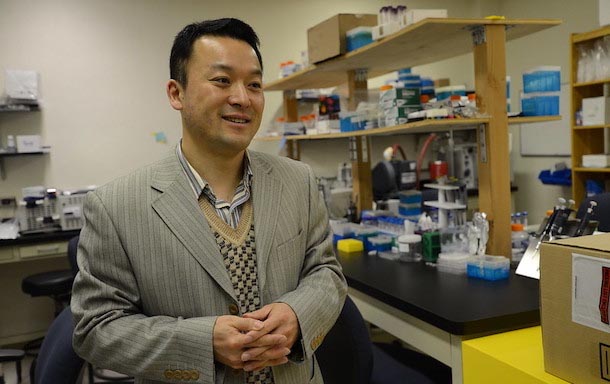
Yong Wang. IMAGE: KATE MYERS, PENN STATE
Penn State engineer aims to tackle COVID-19 from two angles
4/21/2020
By Jamie Oberdick
UNIVERSITY PARK, Pa. — To combat COVID-19 in both the treatment and testing arenas, Yong Wang, Penn State professor of biomedical engineering, has received two grants from the Huck Institutes of the Life Sciences COVID-19 multi-institute seed grant fund.
Wang will use the testing grant to look at the creation of a COVID-19 analysis potentially capable of producing results that could be easily read in minutes. Wang will serve as the primary investigator for the project.
“(Our goal is to) use a very high strong signal to definitively display results to the person administering the test, even if they're not specifically trained,” Wang said. “With this method, at a drive-up testing site, the testers could have the person pull over in their car and wait a few minutes to find out if they are COVID-19 positive.”
Wang’s method involves detection of COVID-19 RNA — the virus’ genetic material — with a portable handheld fluorometer, which uses magnetic beads of iron oxide to extract the RNA.
“The current tests take a long time, require a complicated process, and may not be accurate,” Wang said. “When there are millions of people who need to be diagnosed, you want it to be ready for a very fast examination, that gives a clear signal quickly.”
The most common current method of COVID-19 testing, polymerase chain reaction (PCR), adds enzymes to jump-start a chemical process to enable detection of RNA in nasal swab samples. Sometimes during this process, the enzymes can lose their bioactivity and cause false negative results. Another issue with the tests is that a highly trained individual is needed to read the data to determine the results.
With Wang’s proposed test, special equipment would not be required either, something Wang said would give the test a unique portability.
“Since we plan to do tests at room temperature with simple technology, you wouldn't have to get test results in a laboratory. You can do it in the field,” Wang said. “You can quickly test people on a cruise ship, you can do tests in a parking lot and just about anywhere, so there are a lot of advantages to this method.”
The other seed grant Wang received is for a potential treatment method focused on suppressing cytokine storms in the lungs of patients induced by COVID-19. A cytokine storm, or cytokine release syndrome, is a severe immune reaction where the immune system releases too many cytokines into the blood too quickly. Cytokines are messenger proteins, requesting more or less immune activity depending on the situation. Releasing too many into the blood causes the immune system to overreact and attack healthy tissues, leading to organ damage and even death.
Wang is working with a co-primary investigator, Troy Sutton, Penn State assistant professor of veterinary and biomedical sciences, on this grant. They aim to suppress cytokine storms via living cells and a new cell delivery mechanism.
“Once COVID-19 patients enter intensive care units, pretty much you can only do one thing to keep them alive, and that’s provide oxygen via ventilators,” Wang said. “For full recovery, we have to rely on the patient’s immune system. But the immune system is in chaos due to COVID-19, so we have to rely on something that will allow the immune system to go back to normal.”
In the next three months, Wang and Sutton will collect preliminary data to demonstrate that their new system is able to calm the immune system in cell samples. After that, they will conduct animal studies to see if they can reduce immune activity and even reduce the amount of viral activity. Sutton’s expertise is in working in high containment with highly infectious respiratory pathogens, making him an ideal research partner for Wang.
“We hope to have the first step done within six months,” Wang said.
For Wang, helping humanity, such as fighting a pandemic, is why he became a biomedical engineer.
“Now is the time for us to help our fellow humans, to help our nation and to help our world,” Wang said.



